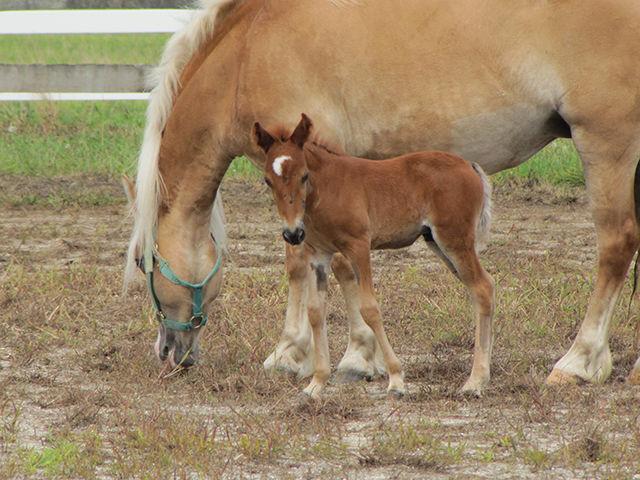The young Colonial Spanish Mustang foal known as Guillermo, or William, was born on the beaches of Corolla, North Carolina and has since been capturing the hearts of many as he fights for his life.
Born on June 12, veterinarians believe William was a premature foal, and like premature human babies, he experienced a host of health complications and internal problems which led to his hospitalization.
“William was born during an extremely hot week,” said Karen McCalpin, executive director of the Corolla Wild Horse Fund (CWHF). “Heat indices were around 107–110. When he was first seen by the CWHF, they were concerned about his extremely small size and lack of vigor. Compared to other foals, he was definitely behind in his size and behavior.”
The plan was to capture both the dam and the foal if his health did not pick up by day five, which is what had to happen, McCalpin explained.
The CWHF, a non-profit organization which aims to protect and preserve the last remaining herd of Spanish Mustangs on the northern Outer Banks, has been raising money for William’s medical expenses with the support of the community. Donations have been facilitated through the Corolla Wild Horses’ Website and a gofundme page that raised more than $25,000 in only one month.
“The story of William’s journey was chronicled on the Corolla Wild Horse Fund’s Facebook page, and over 1.6 million people were touched by it,” McCalpin said. “It has been shared over 11,000 times. Over 600 people from all over the country donated over $25,000 toward his medical care and thousands wrote supportive messages, sent their love and prayed for this wild foal who refused to give up.”
The donations are helping pay for medical bills, according to the CWHF Facebook page. Emergency treatment received in Suffolk, Virginia before being taken to NC State, treatment after leaving NC State and the use of a nurse pony from NC State named Pebbles, are some of the other ways the money is being put to use.
According to McCalpin, William was first taken to Dominion Equine Clinic in Suffolk where blood work was done and fluids were administered. His blood pressure and heart rate were low. He was given oxygen and epinephrine but could not be stabilized. William was then referred to NC State where he was driven by McCalpin and Christina Reynolds, the CWHF’s herd manager.
Pebbles the nurse pony will serve as William’s surrogate mother until he is at least four months old, and it is from Pebbles that William first began to nurse instead of receiving nutrients through a feeding tube.
The CWHF was founded in 1989. The need for the organization arose between 1985 and 1996, when 20 horses were killed by vehicles on the stretch of road between Duck and Corolla. A group of citizen volunteers came together to form the organization, and to prevent further horse fatalities, they moved the remaining 20 horses north of Highway 12 to the “north beach.” Today, the beach area is open to the public, but the horses are protected by an ordinance.
The wild horse group that William was born from is often a point of interest for visitors and tourists, and while the horses may be more accustomed to humans, it is still recommended not to approach them or to move away if they approach you.
These horses are not protected by special state or federal laws, but they are “protected by the Currituck County Wild Horse Ordinance making it illegal to intentionally come within 50 feet of a wild horse or to lure, entice, harass or feed,” the CWHF website stated.
In the case of William, the high temperature at the time of his birth made nursing crucial, but the mother must be still for him to nurse, and vehicles or people may cause a mother to move from her foal and interrupt nursing.
Along with William’s small size, heart problems, respiratory problems and other medical issues, he was found to have elevated liver enzyme levels. These findings were slightly concerning since elevated liver enzymes could be indicative of a problem in the liver or other medical conditions, but William has been closely monitored throughout his healing process and will continue to be monitored.
“William comes from strong stock with an iron will to live,” McCalpin said. “His relatives and ancestors have survived hurricanes and fierce nor’easters on the Outer Banks for nearly five centuries. They are now a critically endangered breed.”
William has healed and triumphed through many phases of his recovery. He has gone from having to have oxygen delivered and using feeding tubes, catheters and IV fluids to being able to successfully nurse and run around like any other healthy foal.
“William has been dubbed by his fans as ‘Iron William,’ ‘The Little Foal That Could,’ ‘Moon Doggie’ and a host of other endearing nicknames,” McCalpin said. “He captured the hearts of over a million people nationally and internationally. Our hope is that William will grow into a strong and healthy colt who will continue to educate the world about the resilience, the intelligence, the grace and beauty of Corolla’s endangered Colonial Spanish Mustangs — the North Carolina State horse.”








